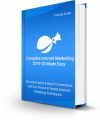
 License Type: Personal Use
License Type: Personal Use  File Type: ZIP
File Type: ZIP
 SKU: 62116
SKU: 62116  Shipping: Online Download
Shipping: Online Download
Sample Content Preview
Waze was founded by Israeli computer programmer Ehud Shabtai and Noam Bardin (CEO) in 2006.
The company was bought out in 2013 by Google. Google is a public company, but revenues of a parent company are usually consolidated into the parent. As such, there isn’t a published breakout of the revenues for Waze. According to a report from Harvard Business School, Waze has 100 million users. This suggests the company is highly profitable. Google (parent company of Waze) does not break out its advertising dollars per user.
[Source: https://digit.hbs.org/submission/show-me-the-waze-to-go-home/]
The company started out as FreeMap Israel and used the concept of crowdsourcing to populate the data needed by the network.
The company calls its users Wazers.
How the Company Started
Ehud Shabtai wanted a map of Israel to be displayed in Hebrew. He needed the data from users of the app and made the app, and usage of the app, free. He considered it a community-based traffic app.
When the company was called FreeMap, it caught the attention of venture capital firms. Waze has secured three funding rounds, for a total of $67 million. When Google acquired the company, it did so at an amount just shy of $1 billion.
Initial Problems
Concern has been ongoing about drivers updating their information while actively driving. While the app is useful to drivers, it is believed to contribute to more accidents, or at least, the possibility of them happening due to app usage. In 2017, the company addressed this by allowing users to record voice navigation prompts. It’s unclear what impact this will have on the problem.
[Source: http://nymag.com/daily/intelligencer/2013/06/did-google-just-buy-a-dangerous-driving-app.html]
In 2014, an article by CDNet.com wrote about a lawsuit against Shabtai. It specifies that Shabtai profited from community-based software which does not allow for the community to benefit financially. This is much like the open-source concept in the development community. However, Shabtai did add value to the data. The outcome of this lawsuit is unclear.
The app has a feature for locating where the police are. There is growing criticism that this could hinder the ability of the police to get their jobs done. It could allow criminals access to this data that would not be available without the service. Google’s position is that knowing where the police are located promotes safe driving. There is no indication of any further developments on this issue.
Several years ago, the major mobile data providers (Verizon, AT&T) switched to limited service plans. For apps that rely on data to be free flowing with unlimited plans, this could limit use by customers. The industry has since reintroduced unlimited plans, albeit at a higher cost.
Some towns are complaining that GPS-based programs are turning tiny streets into traffic nightmares. The apps often redirect traffic
to these tiny streets, and when people follow the advice, it creates a traffic surge for these streets.
[Source: https://www.sfgate.com/bayarea/article/Waze-Google-Maps-San-Francisco-reroute-12898001.php]
Los Angeles is considering taking legal action against Waze for redirecting Wazers to residential streets. [Source: http://www.govtech.com/fs/LA-Considers-Legal-Action-to-Stop-Waze-from-Routing-Commuters-Through-Neighborhoods.html]
Why it Works
Users who want real-time traffic data can download the Waze app for free. They can also participate by submitting data in real-time about gas prices and traffic info.
Waze users can also find the lowest gas prices, again with the help of other users in the network. These other users submit gas prices when they observe them.
Waze has formed several partnerships with companies who want access to the network.
When people find the best routes where they aren’t stuck in traffic, in a small way, they are helping the environment. When you multiply that by the number of users who use the app to avoid traffic jams, that savings can be significant. The savings on money from not being stuck in traffic is an easy sell, too.
Waze has expanded its data by partnering with many governments. Both entities (Waze and Governments) benefit by provided each other with traffic data, road closures, updates, etc.
The company has been test-marketing a carpooling feature of its app. The aim of this initiative is to reduce the amount of traffic by getting people to hook up in real time. It’s an answer to the problem of differing schedules for regular carpoolers. The company hopes to use this initiative to eventually change the patterns of buying cars in the future. It feels that it should prompt people to not need cars as much. That is an aggressive goal and one that requires changing people’s perceptions about the need for having a car. However, this initiative could save people money on parking, which is huge and could be a selling point.
[Source: https://soundcloud.com/cbinsights/a-conversation-with-noam-bardin-founder-of-waze]
The overhead for the company is quite low. It uses crowdsourcing for data acquisition, which means little-to-no costs. The biggest costs are the network and app development and maintenance.
- License: Personal Use
- Category:Ebooks
- Tags:2018 Ebooks Personal Use







